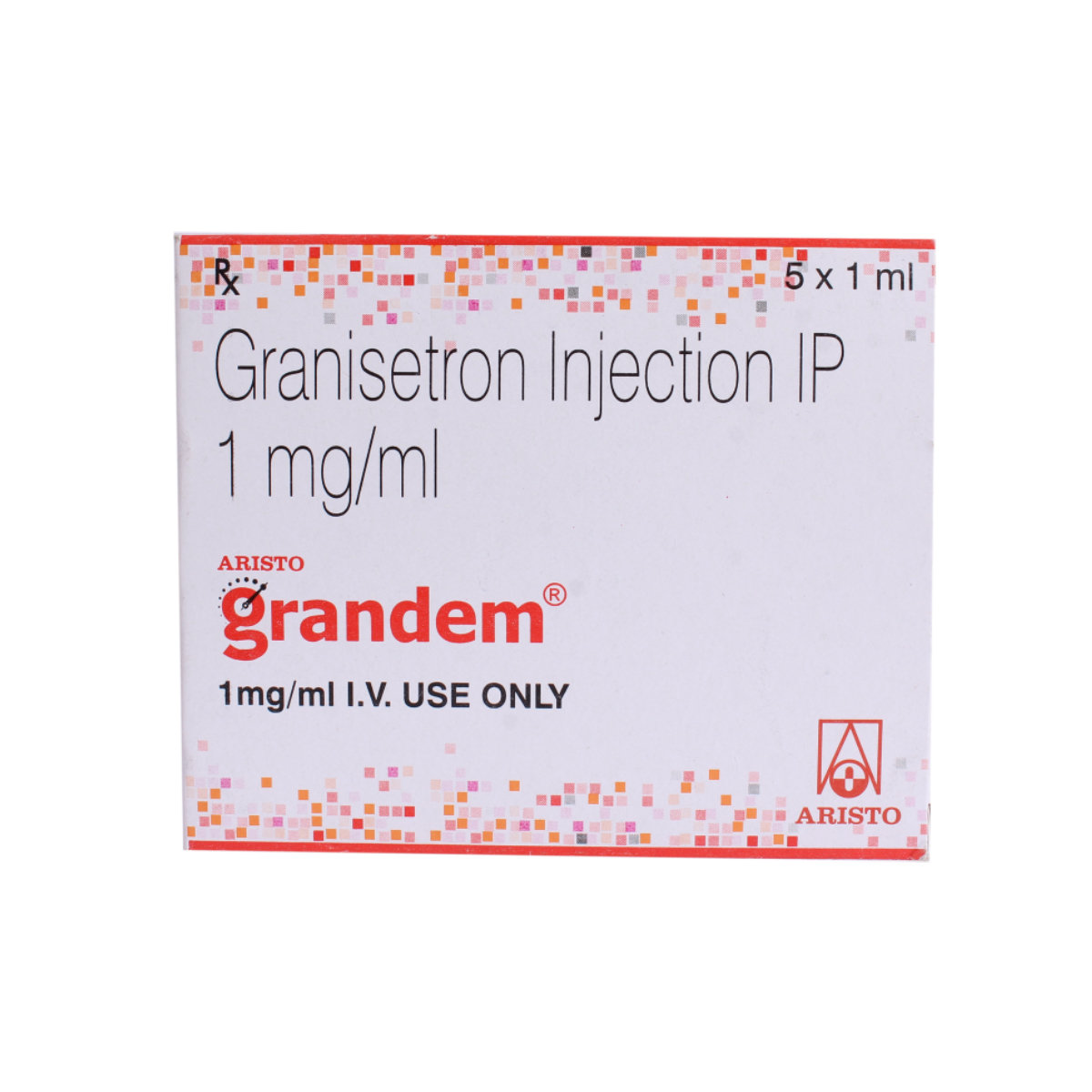GRANIFORCE INJECTION 1ML
MRP ₹29.2
(Inclusive of all Taxes)
₹4.4 Cashback (15%)
Provide Delivery Location
Online payment accepted
 Prescription drug
Prescription drugWhats That
Composition :
Manufacturer/Marketer :
Consume Type :
Expires on or after :
Return Policy :
About GRANIFORCE INJECTION 1ML
GRANIFORCE INJECTION 1ML belongs to the class of 'anti-emetic' drugs, primarily used to treat nausea and vomiting caused by medical treatments after surgery or chemotherapy or radiation treatment for cancer. Nausea is defined as stomach discomfort and the sensation of an urge to vomit. Vomiting is the forcible voluntary or involuntary emptying of contents of the stomach through the mouth.
GRANIFORCE INJECTION 1ML contains an anti-emetic (eases vomiting symptoms) medicine, 'Granisetron', that belongs to the class of 5-HT3 receptor antagonists (also called serotonin receptor antagonists or serotonin blockers). It works by blocking the brain's serotonin (chemical messenger) activity that triggers nausea and vomiting during cancer treatment (chemotherapy or radiation therapy) or after surgery.
GRANIFORCE INJECTION 1ML will be administered by a healthcare professional; do not self-administer. Your doctor will decide the dose and duration based on the severity of your medical condition. Common side effects of GRANIFORCE INJECTION 1ML include diarrhoea, constipation, stomach pain, weakness, headache, fever, drowsiness, trouble sleeping, pain, redness, and swelling at the injection site. These side effects are not familiar to everyone and vary individually. If you notice any side effects that are not manageable, please consult your doctor.
If you use other prescription or non-prescription medicines, inform your doctor before using GRANIFORCE INJECTION 1ML. Let your doctor know if you have any liver, kidney or heart diseases, stomach/intestinal problems, allergic reactions, and low levels of potassium and magnesium in the blood before starting GRANIFORCE INJECTION 1ML. This medicine may make you dizzy or drowsy; hence avoid driving or operating machinery if you are not mentally alert. Consult your doctor before using GRANIFORCE INJECTION 1ML if you are pregnant, planning for pregnancy or breastfeeding. Avoid consuming alcohol while being treated with GRANIFORCE INJECTION 1ML as it could lead to unwanted side effects.
Uses of GRANIFORCE INJECTION 1ML
Directions for Use
Key Benefits
GRANIFORCE INJECTION 1ML contains an anti-emetic medicine, 'Granisetron', that treats nausea and vomiting caused due to cancer treatment (chemotherapy or radiation therapy) or after surgery. Granisetron belongs to the class of 5-HT3 receptor antagonists (also called serotonin receptor antagonists or serotonin blockers). When the cells lining the gastrointestinal tract are damaged by chemotherapy or radiation therapy, they release a natural substance called serotonin (5HT3, 5-hydroxytryptamine). This serotonin binds to serotonin receptors on nerves that induces nausea and vomiting. GRANIFORCE INJECTION 1ML works by blocking the brain's serotonin activity and preventing postoperative nausea and vomiting.
Storage
Drug Warnings
Seeking medical advice if you use prescription or non-prescription medicines while being treated with GRANIFORCE INJECTION 1ML is suggested. Inform your doctor about a history of stomach/intestinal problems, heart diseases, electrolyte imbalance (potassium, sodium or calcium), and liver or kidney diseases before starting GRANIFORCE INJECTION 1ML. Please consult your doctor if you are pregnant or breastfeeding if the doctor advised you GRANIFORCE INJECTION 1ML. This medicine may make you feel dizzy, so drive or operate machinery only if you are alert. Avoid consuming alcohol during the course, as it could lead to increased dizziness. GRANIFORCE INJECTION 1ML is not recommended in children below two years of age.
Drug-Drug Interactions
Drug-Drug Interactions
Login/Sign Up
Taking Graniforce Injection 1ml with Thioridazine can increase the risk of an irregular heart rhythm.
How to manage the interaction:
Taking Graniforce Injection 1ml with Thioridazine is not recommended as it can result in an interaction, it can be taken if a doctor has advised it. However, if you experience abrupt dizziness, lightheadedness, fainting, shortness of breath, or heart palpitations while taking any of these drugs, consult a doctor immediately. Do not discontinue any medications without a doctor's advice.
When Graniforce Injection 1ml is taken with Saquinavir, can increase the risk of an irregular heart rhythm.
How to manage the interaction:
Taking Graniforce Injection 1ml with Saquinavir is not recommended as it can result in an interaction, it can be taken if a doctor has advised it. However, if you experience abrupt dizziness, lightheadedness, fainting, shortness of breath, or heart palpitations while taking any of these drugs, consult a doctor immediately. Do not discontinue any medications without a doctor's advice.
Taking Graniforce Injection 1ml with mesoridazine can increase the risk of an irregular heart rhythm. I
How to manage the interaction:
Taking Mesoridazine with Graniforce Injection 1ml is not recommended as it can result in an interaction, it can be taken if a doctor has advised it. However, if you experience abrupt dizziness, lightheadedness, fainting, shortness of breath, or heart palpitations while taking any of these drugs, consult a doctor immediately. Do not discontinue any medications without a doctor's advice.
Taking Graniforce Injection 1ml with Sparfloxacin can increase the chance of a serious abnormal heart rhythm.
How to manage the interaction:
Taking Graniforce Injection 1ml with Sparfloxacin is not recommended as it can result in an interaction, it can be taken if a doctor has advised it. However, if you experience sudden dizziness, lightheadedness, fainting, breathing difficulty, or rapid heartbeat, consult the doctor immediately. Do not stop using any medications without talking to a doctor.
Taking Graniforce Injection 1ml with Cisapride can increase the risk of an irregular heart rhythm.
How to manage the interaction:
Taking Graniforce Injection 1ml with Cisapride is not recommended as it can result in an interaction, it can be taken if a doctor has advised it. However, if you experience abrupt dizziness, lightheadedness, fainting, shortness of breath, or heart palpitations while taking any of these drugs, consult a doctor immediately. Do not discontinue any medications without a doctor's advice.
Taking Graniforce Injection 1ml with Ziprasidone can increase the risk of abnormal heart rhythm.
How to manage the interaction:
Taking Graniforce Injection 1ml with Ziprasidone is not recommended, as it can result in an interaction, it can be taken if a doctor has advised it. However, if you experience sudden dizziness, lightheadedness, fainting, breathing difficulty, or rapid heartbeat, consult the doctor immediately. Do not stop using any medications without talking to a doctor.
Taking Graniforce Injection 1ml with Pimozide can increase the risk of an irregular heart rhythm.
How to manage the interaction:
Taking Graniforce Injection 1ml with Pimozide is not recommended as it can result in an interaction, it can be taken if a doctor has advised it. However, if you experience abrupt dizziness, lightheadedness, fainting, shortness of breath, or heart palpitations while taking any of these drugs, consult a doctor immediately. Do not stop using any medications without talking to a doctor.
Taking Graniforce Injection 1ml with Dronedarone can increase the risk of irregular heart rhythm.
How to manage the interaction:
Taking Graniforce Injection 1ml with Dronedarone is not recommended as it can result in an interaction, it can be taken if a doctor has advised it. However, if you experience abrupt dizziness, lightheadedness, fainting, shortness of breath, or heart palpitations while taking any of these drugs, consult a doctor immediately. Do not discontinue any medications without a doctor's advice.
Taking Graniforce Injection 1ml with trazodone increases the risk of serotonin syndrome (a condition in which a chemical called serotonin increase in body).
How to manage the interaction:
There may be a possibility of interaction between Trazodone and Graniforce Injection 1ml, but it can be taken if prescribed by a doctor. However, if you experience confusion, seizure(fits), extreme changes in blood pressure, increased heart rate, fever, excessive sweating, shivering or shaking, blurred vision, muscle spasm, tremor (shaking of hands & legs), incoordination, stomach pain, nausea, vomiting, and diarrhea contact your doctor right away. Do not discontinue any medications without first consulting a doctor.
Using Moxifloxacin together with Graniforce Injection 1ml can increase the risk of an irregular heart rhythm.
How to manage the interaction:
Taking Moxifloxacin with Graniforce Injection 1ml together can result in an interaction, but it can be taken if a doctor has advised it. However, if you experience dizziness, breathing difficulty, or rapid heartbeat, consult the doctor immediately. Do not stop using any medications without talking to a doctor.
Drug-Food Interactions
Drug-Food Interactions
Login/Sign Up
Diet & Lifestyle Advise
- Avoid chocolates, junk food, cheese, processed food, alcohol, and smoking.
- You can try increasing your mindfulness by doing yoga, meditation, mindfulness-based cognitive therapy, and stress reduction techniques.
- Drink enough water to stay hydrated and limit or avoid alcohol and caffeine.
- Include a diet rich in whole grains, vegetables, and fruits.
- You can include antioxidants in your daily diet, like ashwagandha, omega-3 fatty acids, green tea, and lemon.
- Try to spend time with your friends and family. Having a strong social network may help you lower your risk of anxiety.
Side Effects of GRANIFORCE INJECTION 1ML
- Diarrhoea
- Constipation
- Stomach pain
- Weakness
- Headache
- Fever
- Dizziness
- Drowsiness
- Trouble sleeping
- Pain, redness, and swelling at the injection site
Habit Forming
Therapeutic Class
All Substitutes & Brand Comparisons
RX
Out of StockEmergan 1mg Injection
H Care India
₹72
(₹21.6/ 1ml)
17% CHEAPERRX
Out of StockMagidon 1mg Injection
₹72.3
(₹21.69/ 1ml)
17% CHEAPERRX
Out of StockGrazit 1mg Injection
₹75
(₹22.5/ 1ml)
14% CHEAPER
Author Details
We provide you with authentic, trustworthy and relevant information
Drug-Diseases Interactions
Drug-Diseases Interactions
Login/Sign Up
FAQs
Drug-Drug Interactions Checker List
- FLUOXETINE
- DULOXETINE
- AMIODARONE
- SOTALOL
- PIMOZIDE
- ERYTHROMYCIN
Special Advise
- Let your doctor know you are taking GRANIFORCE INJECTION 1ML if you undergo medical tests.
- Heart function monitoring with an ECG or EKG (electrocardiogram) is recommended in heart patients since GRANIFORCE INJECTION 1ML may cause irregular heartbeat and QT prolongation (heart muscle takes longer than normal to recharge between beats).
Disease/Condition Glossary
Nausea is defined as stomach discomfort and the sensation of an urge to vomit. It is a precursor to vomiting. It is not a painful symptom but can cause discomfort in the chest, upper abdomen, or back of the throat. Nausea can be triggered by various factors like motion from a car and plane, taking pills on an empty stomach, eating too much or too little, and drinking excessive amounts of alcohol.
Vomiting or throwing up is the forcible voluntary or involuntary emptying of contents of the stomach through the mouth. Vomiting can also occur without any underlying diseases like pregnancy, hangovers, overeating, and motion sickness. Nausea or vomiting may be triggered by many factors, including food poisoning, gastritis (inflammation of the stomach lining), an ulcer, or bulimia (eating disorder).

Have a query?
Alcohol
Safe if prescribed
You are recommended to limit or avoid alcohol consumption while taking GRANIFORCE INJECTION 1ML. Alcohol intake, along with GRANIFORCE INJECTION 1ML, may lead to unwanted side effects and cause increased dizziness.
Pregnancy
Consult your doctor
It is not known if GRANIFORCE INJECTION 1ML affects pregnancy. Please inform your doctor if you are pregnant or planning pregnancy before receiving GRANIFORCE INJECTION 1ML.
Breast Feeding
Consult your doctor
It is not known if this medicine passes into breast milk. Please inform your doctor before taking GRANIFORCE INJECTION 1ML if you are a nursing mother.
Driving
Safe if prescribed
GRANIFORCE INJECTION 1ML may make you feel dizzy, affecting your mental ability. Do not drive or operate machinery if you experience dizziness.
Liver
Consult your doctor
GRANIFORCE INJECTION 1ML should be used with caution if you have liver disease. Please inform your doctor if you have a history of liver impairment before starting GRANIFORCE INJECTION 1ML.
Kidney
Consult your doctor
GRANIFORCE INJECTION 1ML should be used with caution if you have kidney problems. Please inform your doctor if you have a history of kidney impairment/kidney disease.
Children
Safe if prescribed
Safety and efficacy of GRANIFORCE INJECTION 1ML have not been established in children below 2 years of age.











